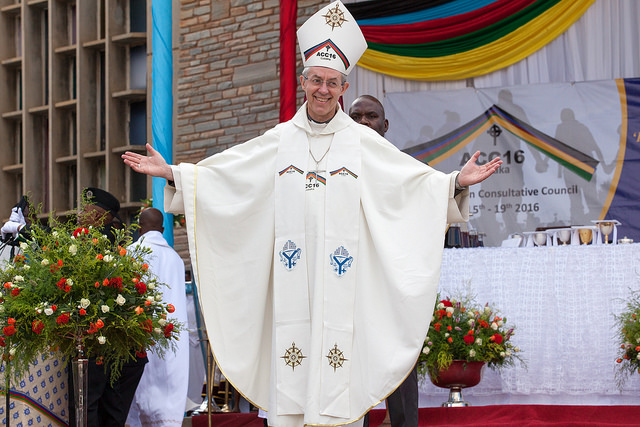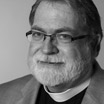Summary: On matters of human sexuality, does the Archbishop of Canterbury believe that one must sacrifice the clarity and authority of the Bible to reach lost people? If so, he should admit it clearly and let the rest of the Communion move on. For what he will have left to share is an amputated gospel: grace without guilt, confession without conviction, response without repentance, imagination in place of revelation, and imitation without imputation. In the hopes of reaching people with a more “generous” Gospel in the short run, he will have made that very Gospel even more irrelevant in the long run to the very people he says he wants to reach.
Justin Welby, the Archbishop of Canterbury, seems to have a genuine, passionate commitment to “re-evangelize” England. He wants to keep all of the benefits of an “established” Church, which has a unique public platform for such evangelism of the nation. He has to win back a hostile, secular culture in which the majority of a younger generation believes in same-sex marriage and finds the traditional Biblical view of marriage immoral.
He also seems willing to write off those people in the Church of England who believe that the Scriptures speak with both clarity and authority to issues of human sexuality—including homosexuality and the blessing of same sex unions. As we noted last week his Executive Officer has admitted their willingness to “write off” 20% of its membership that cannot agree with the projected results of the “Shared conversations” currently taking place in the Church of England—results that will almost certainly include some “pastoral accommodation” of the blessing of civil same-sex partnerships, in keeping with the recommendations of the Pilling Report. No doubt this is driving the failure of the “Shared Conversations” to engage the Scriptures seriously and with integrity, as we also noted here.
If the Archbishop of Canterbury shares the projection of his Executive Officer (and there is no reason to believe he disagrees) he will be posting a “no trespassing” sign on these matters of human sexuality when it comes to the Bible. For the sake of reaching the nation, he appears willing to “write off” those Scriptures that speak with clarity and authority to matters of human sexuality—Scriptures which are the foundation of Lambeth 1998 Resolution I.10’s prohibition of any Anglican blessing of same-sex unions.
Here’s the problem: Once you post a “No-trespassing” sign on one part of human life, and say that God’s word is not welcome there, where do you stop? Once you write off one part of God’s word, the Scriptures, despite its clarity and authority, where do you stop? If same-sex unions are off limits, why not open-marriage, or polygamy (men with multiple women) or polyandry (women with multiple men), or incest or pedophilia? We may say that “we will draw the line here and go no further,” but logically once you have abandoned the clarity and authority of Scripture one place, you have no grounds to draw the line anywhere except where the cultural consensus says we should.
But cultural consensus is nothing more than shifting sand. By this point we have gone over the cliff and substituted what is politically and socially correct for the clarity and authority of the Bible. It may even be in the apparent “good interests” of reaching people with a kinder and gentler Gospel. If we avoid saying things that we know are politically and socially incorrect, we might win a place to share with them about Jesus Christ, right?
And what would we share with them about Jesus? That He is Lord and Savior of those areas of their life where he is not offensive? Those areas where he does not look at sin and say as he did to the woman in John 8 “You are forgiven—go and sin no more?” – because we refuse to label certain things as sin? What would it be like to follow Jesus Christ except in those areas of life where we and the Church have posted a “no-trespassing” sign? Perhaps we could say that he is the one that we follow around the felt needs that we permit him to address, until it becomes uncomfortable! But then how can we say, as Christians have said for centuries, that he is Lord and Savior of our lives, our whole lives?
Paul anticipated this very dilemma when he wrote in 2 Timothy 4:3 “For the time will come when men will not put up with sound doctrine. Instead, to suit their own desires, they will gather around them a great number of teachers to say what their itching ears want to hear.” When the Church gives in to itching ears, it offers an amputated Gospel. To itching ears it offers grace without guilt, confession without conviction, response without repentance, imagination in place of revelation, and discipleship as a matter of imitation without imputation (receiving the fullness of Christ’s life and power to change us from the inside out).
In Nairobi, Kenya I still remember a Sunday lunch Archbishop Eliud Wabukala hosted for Archbishop Justin Welby and other Archbishops, bishops and honored guests gathered the day before GAFCON 2013 began. During that lunch, Archbishop Peter Jensen gave the opening remarks. He reminded all those present—and as he looked directly at Archbishop Justin Welby—that he and other GAFCON Primates had been asked not once, not twice, but three times to go back to their Bibles and reread what it had to say about issues of sexuality. Archbishop Peter Jensen said that he and the GAFCON Primates had done so, and had concluded that God’s word on homosexuality and same-sex marriage was clear, authoritative and unchanged. On the eve of GAFCON 2013, he cited this conviction as among the principal reasons he and others in GAFCON were standing for Biblical clarity and authority.
Immediately following, Archbishop Welby was invited to give remarks. He came forward and thanked Archbishop Jensen for his stirring speech. He then gave brief remarks that concluded with, “please don’t forget lost people.” And then he sat down.
The Archbishop of Canterbury failed to engage Archbishop Jensen’s remarks about Biblical clarity and authority. In that context, his plea not to forget lost people reveals the false dichotomy that seems to be at the heart of Canterbury’s thinking and the “Shared conversations.” It is just this: that if we hold fast to the clarity and authority of the Bible, we will never reach lost people.
If this is the conclusion he has reached, the Archbishop of Canterbury should simply admit it so that the rest of the Communion can walk together. There is a better way—an Anglican way. The Anglican way is to take Scripture seriously, in both its clarity and its authority. Look at the plain grammatical sense of the words in the Bible. Go back to the context in which these words were first addressed. Start small and extend outward: verse, passage, chapter, book author and testament/covenant. Try to come to grips with how the original audience would have understood the text. Consider the width of the chasm between us and the original audience. Where there is a moral command from the Old Testament that is repeated in the New Testament, it is an example of a “timeless truth.” Remember that each passage has one correct interpretation, but many applications (some better than others). Always do this hard work humbly, asking the Holy Spirit to help us, but also in the Spirit of reverence for God’s Word—for it stands over us, and not vice-versa.
This is the work we must do to open the Bible so that we can reach lost people with the transforming love of Jesus Christ. Anything else is a shortcut to try and reach people on their terms, to satisfy itching ears. It reminds me of another time when someone “despised his birthright” for short term gain—when Esau sold his birthright to Jacob for a mess of bread and lentil stew (Gen. 25:29-34). Anglicans are poised to give up their Reformation birthright, the trustworthiness of the Bible in all things, for a mess of politically and socially correct stew. What a tragedy! They will have given away the very objective truths they will need to do justice and love mercy elsewhere. They will have settled for an amputated Gospel in the hopes of reaching more people because it is more “generous”—and in doing so will have made the Gospel increasingly irrelevant to those very people they want to reach!
The Rev. Canon Phil Ashey is President & CEO of the American Anglican Council.



